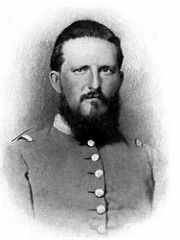Winchester, December 29, 1861.
The weather opened this morning cloudy and showing signs of snow, but, much to my disappointment, the clouds have passed off leaving a clear sky and pleasant day. It is not often I wish for bad weather, but when it opens a way for me of getting home for a little while I bid it a hearty welcome. It troubled me less when there was no prospect of getting a leave of absence and no use of asking it; but as I have been so anxiously indulging the hope of late, it troubles me much to have it deferred. If the bright sunshine of to-day is destined to last, you need not expect me, for Jackson is not disposed to lie idle when there is an opportunity to win laurels for himself and render service to our cause. The arrival of our forces from the West under Loring has given him a very fine army, which I think he is disposed to turn to a very profitable use as soon as an occasion may offer itself. I have much reason to be gratified at the proofs of his good opinion and confidence which I am continually receiving from him. I can rely upon his influence and efforts for my promotion, but my ambition does not run in that direction. The sympathies of my heart and my aspirations for the future are all absorbed in the wife and little ones left at home, and my highest ambition is to spend my life there in peace and quiet. The hope of winning military titles and distinction could not tempt me to leave home, if I were left to consult my wishes and feelings alone. But the sense of public duty which prompts us, and the strong public sentiment which forces us, to leave our homes and families for the public service, now with equal force compels us to remain. If we left the army now, it would be at the sacrifice of such good opinion as we have of ourselves and the good opinion entertained of us by our neighbors and friends at home. Our term of service will expire in May, when each will be left to pursue for himself such course as duty and inclination may then determine. It is sad, indeed, to think of being a stranger in my own home, that wife and children are becoming used to my absence and forced by it to seek other sources of happiness than that which we used to have when the society of each other was the greatest source of enjoyment. When separation is so long protracted it seems akin to that which lasts forever, when the body has gone to its long home in the grave and the soul for weal or woe to eternity, when the loved left behind to mourn our loss are no longer left a hope, and after a while become used to the desolation which death has left them. But hope whispers, Love, that all may yet be well with us. The storm may pass away, and, living happily together in after years, it will be a source of pride and happiness to us that the duty patriotism exacts of me now has been faithfully discharged, and the pleasure and comfort of home for the time foregone.
I wrote you a long business letter on Friday, in which you will think, no doubt, I have marked out work enough to keep you employed next year. You will be too busy to think of me and the troubles which this war is bringing on us. Now, darling, as my half sheet is finished I will bid you good-bye. Kiss my three little baby boys for me, and send me your likeness–the old one which I used to have– by the first person who comes from Lexington.
